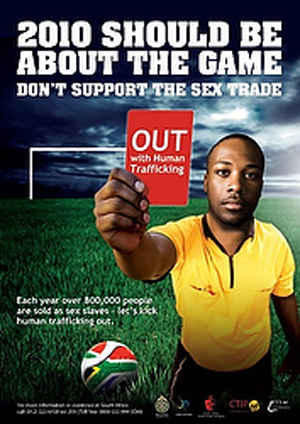Sexual Behavior | World Cup South Africa Games
/ Note that the photo used by the Global Post article doesn’t include any dark-skinned women. The prostitutes are actually women of every nationality and skin color. South Africa’s Drug Central Authority estimates 40,000 sex workers from Russia, the Congo, Nigeria and more countries will cater to the wide taste spectrum of some 400,000 mostly guy visitors to the June 2010 World Cup soccer games, running June 11-July 11, 2010.
Note that the photo used by the Global Post article doesn’t include any dark-skinned women. The prostitutes are actually women of every nationality and skin color. South Africa’s Drug Central Authority estimates 40,000 sex workers from Russia, the Congo, Nigeria and more countries will cater to the wide taste spectrum of some 400,000 mostly guy visitors to the June 2010 World Cup soccer games, running June 11-July 11, 2010.
Carol Allais of the University of South Africa, UNISA, says such claims are exaggerated and alarmist.
Even President Jacob Zuma — himself a polygamist, father of at least 20 children and an infamous condom skeptic — isn’t taking any frivolous chances with the World Cup. During his official visit to the United Kingdom in March, he asked the government to supply 1 billion extra condoms to South Africa before the upcoming tournament. via Global Post
Britain responded by sending 42 million condoms, a number that supplies every citizen of South Africa with one condom or every tourist expected to travel there with one hundred. There is serious concern in Europe that AIDS infections will increase after the games. The South Africans bristle at these suggestions.
It is a fact that many men don’t like condoms. AIDS rates in South Africa and neighboring countries are very high around AIDS transmission.
Sex Trafficking
Concerns are equally high about the sex trafficking of young girls into South Africa for the games.

Using the 2010 World Cup to exploit vulnerable women, children and men for slave labor, the sex industry or the drug trade is “an outright perversion of the spirit and ethical dimension of sport as well as of the idea and dignity of the human person,” said Salesian Sister Bernadette Sangma, the project coordinator. via Catholic News
There is no law in South Africa against sex trafficking, although authorities did use an existing racketeering law against a couple, achieving a conviction in March 2010.
The fact that the government has decided to close schools drives concerns that young girls will be available, often believing that are taking jobs as waitresses or hotel housekeepers, when they are actually being ensnared by sex traffickers.
The women’s religious orders’ international network called “Talita Kum,” Aramaic for “Get Up,” is carrying out an awareness campaign in South Africa, neighboring countries, countries where large numbers of fans are expected to come from, and countries such as Thailand, where victims of trafficking are likely to be targeted, said Sister Sangma. via Catholic News
TIME magazine wrote an in-depth piece In January 2010 Sex Trafficking in South Africa: World Cup Slavery Fear. It concerns me that having just Google Newsed this subject, there’s minor interest in the subject in the global media. The case in Germany 2006 was very different.




















































